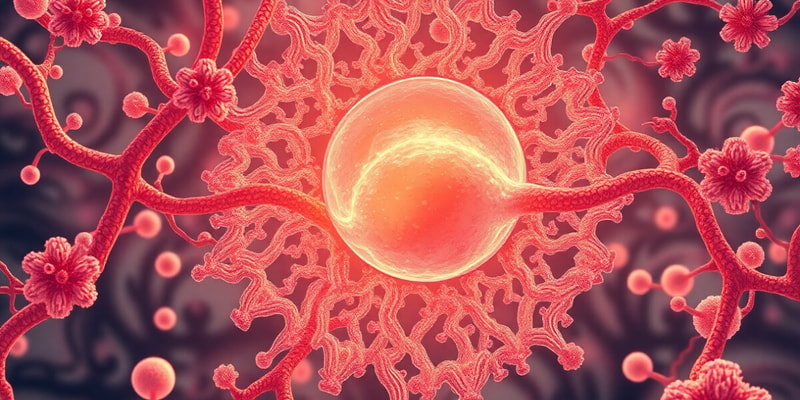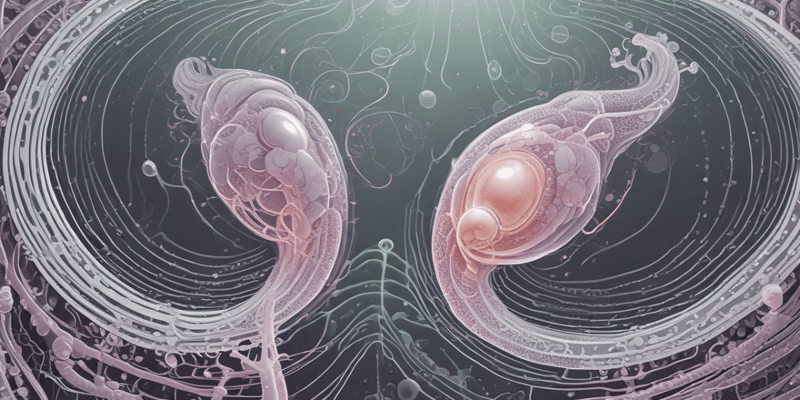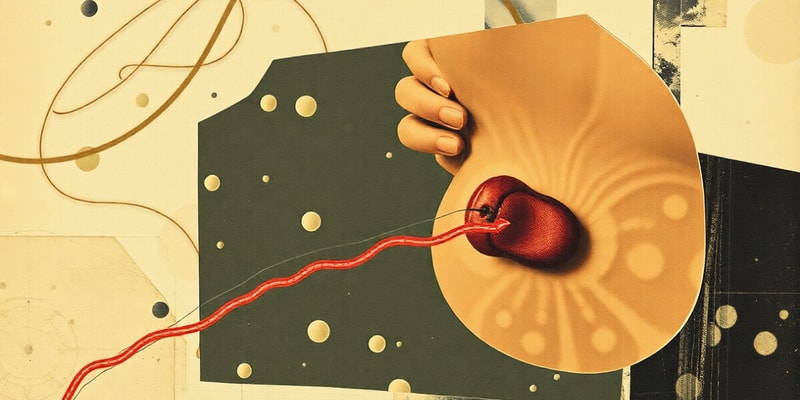Podcast
Questions and Answers
What is the result of the first meiotic division of a primary oocyte?
What is the result of the first meiotic division of a primary oocyte?
Which function does hyaluronidase serve during sperm penetration?
Which function does hyaluronidase serve during sperm penetration?
What occurs to a secondary oocyte if fertilization does not happen?
What occurs to a secondary oocyte if fertilization does not happen?
What is the primary role of sperm acrosome reaction?
What is the primary role of sperm acrosome reaction?
Signup and view all the answers
Which type of mucopolysaccharides is characterized by being stretchy and clear, aiding in sperm movement?
Which type of mucopolysaccharides is characterized by being stretchy and clear, aiding in sperm movement?
Signup and view all the answers
During spermatogenesis, what occurs after secondary spermatocytes undergo meiosis II?
During spermatogenesis, what occurs after secondary spermatocytes undergo meiosis II?
Signup and view all the answers
What physiological change occurs in sperm during capacitation?
What physiological change occurs in sperm during capacitation?
Signup and view all the answers
What is formed after the completion of meiosis II in a secondary oocyte following fertilization?
What is formed after the completion of meiosis II in a secondary oocyte following fertilization?
Signup and view all the answers
What is the primary function of the contents released from cortical granules into the perivitelline space during fertilization?
What is the primary function of the contents released from cortical granules into the perivitelline space during fertilization?
Signup and view all the answers
What effect does high voltage have on the fertilization process?
What effect does high voltage have on the fertilization process?
Signup and view all the answers
Which of the following statements about cleavage divisions in mammals is correct?
Which of the following statements about cleavage divisions in mammals is correct?
Signup and view all the answers
How does nicotine affect the fast block to polyspermy?
How does nicotine affect the fast block to polyspermy?
Signup and view all the answers
What type of cleavage do frogs exhibit, and how does yolk distribution affect this?
What type of cleavage do frogs exhibit, and how does yolk distribution affect this?
Signup and view all the answers
Which of the following correctly describes the process of meroblastic cleavage in fruit flies?
Which of the following correctly describes the process of meroblastic cleavage in fruit flies?
Signup and view all the answers
What occurs during the fast block to polyspermy following fertilization?
What occurs during the fast block to polyspermy following fertilization?
Signup and view all the answers
Which statement describes the cleavage pattern in telolecithal eggs?
Which statement describes the cleavage pattern in telolecithal eggs?
Signup and view all the answers
What is the main consequence of cleavage partitions during Roux's evidence for mosaic development?
What is the main consequence of cleavage partitions during Roux's evidence for mosaic development?
Signup and view all the answers
What happens to the control of development during the mid-blastula transition?
What happens to the control of development during the mid-blastula transition?
Signup and view all the answers
What is the effect of removing cytoplasm on the timing of the mid-blastula transition?
What is the effect of removing cytoplasm on the timing of the mid-blastula transition?
Signup and view all the answers
Which mechanism leads to the establishment of cell fate during mosaic development?
Which mechanism leads to the establishment of cell fate during mosaic development?
Signup and view all the answers
Which process is associated with the transition of the blastula to the morula in mammals?
Which process is associated with the transition of the blastula to the morula in mammals?
Signup and view all the answers
What characterizes regulative development as demonstrated by Driesch's experiments?
What characterizes regulative development as demonstrated by Driesch's experiments?
Signup and view all the answers
In the late blastula stage, which cellular changes occur?
In the late blastula stage, which cellular changes occur?
Signup and view all the answers
What occurs as a result of the critical ratio of nuclear to cytoplasmic components during embryonic development?
What occurs as a result of the critical ratio of nuclear to cytoplasmic components during embryonic development?
Signup and view all the answers
During which cycle does the dramatic slowing of the cell cycle occur, marking the onset of zygotic transcription?
During which cycle does the dramatic slowing of the cell cycle occur, marking the onset of zygotic transcription?
Signup and view all the answers
What role do maternal mRNAs play in early embryonic development?
What role do maternal mRNAs play in early embryonic development?
Signup and view all the answers
Study Notes
Spermatogenesis
- Primordial germ cells (PGC) differentiate into spermatogonia at puberty, initiating spermatogenesis.
- Spermatogonia are diploid stem cells that undergo mitosis to form primary spermatocytes.
- Primary spermatocytes, after mitosis, are also diploid and undergo meiosis I, producing two haploid secondary spermatocytes.
- Secondary spermatocytes undergo meiosis II to yield four haploid spermatids, which differentiate into spermatozoa.
- Golgi apparatus aligns to the sperm's head, forming the acrosome, while globular actin forms between the nucleus and Golgi.
- Mitochondria and centrosomes migrate towards the tail, and flagella develop as cytoplasm is eliminated.
Sperm Maturation
- Hormone-mediated process involving endocytosis of epididymosomes, which provide miRNA as epigenetic information.
- Capacitation destabilizes the acrosome, preparing sperm for fertilization.
- Hyperactivation occurs in the presence of oocyte, increasing flagellar amplitude and frequency, influenced by ZP3 and progesterone.
Oogenesis
- Oogonia undergo mitotic divisions prenatally to become primary oocytes, which are diploid and arrest in prophase of meiosis I.
- Upon ovulation, primary oocyte completes meiosis I to form a secondary oocyte and a first polar body.
- Fertilization prompts secondary oocyte to complete meiosis II, resulting in an ovum and a second polar body.
Mucopolysaccharides in Sperm Interaction
- Come in three forms: G-mucopolysaccharides (dense and sticky, block sperm), L-mucopolysaccharides (block ineffective sperm), S-mucopolysaccharides (stretchy and direct sperm movement).
Syngamy Process
- Sperm approaches cumulus cells, undergoes hypercapacitation, and utilizes hyaluronidase to penetrate the cumulus.
- Upon hitting the zona pellucida, it stimulates the acrosome reaction, leading to the release of cortical granule contents that prevent polyspermy.
Fast Block to Polyspermy
- High voltage acts as a fast block to polyspermy; low voltage allows it.
- Nicotine inhibits the electrical block, leading to an increased chance of polyspermy, demonstrated by voltage clamping experiments.
Cleavage
- Cleavage divisions occur rapidly without G1 or G2 phases due to Cdk1-cyclinB promoting mitosis.
- Cells become smaller with each division, remain transcriptionally silent, and rely on maternal oocyte stores for regulation.
- Different cleavage patterns occur based on yolk distribution:
- Telolecithal (fish, birds) - dense yolk, meroblastic cleavage.
- Mesolecithal (amphibians) - yolk in one hemisphere.
- Isolecithal (mammals) - evenly distributed yolk, holoblastic cleavage.
Cleavage Divisions in Various Organisms
- Frogs exhibit mesolecithal yolk in the lower half with holoblastic cleavage and asymmetric divisions.
- Fish and birds exhibit meroblastic cleavage with dense yolk and incomplete divisions.
- Mammals maintain holoblastic cleavage where divisions pass completely through the egg.
Theories on Development
- Weismann's Theory emphasizes that cleavage partitions ingredients for future cell fate.
- Roux's mosaic development shows that damaged cells do not divide normally.
- Driesch's regulative development reflects how separated cells can still develop normally into smaller embryos.
Mid-Blastula Transition (MBT)
- Transition signifies the shift from maternal to zygotic control of development.
- Early blastula features rapid cleavage with no transcription, while late blastula introduces gap phases and asynchronous divisions.
- Experiments demonstrate that the MBT occurs based on cytoplasmic-nuclear ratio; significant transition occurs at cycle 14 with Zygotic transcription activated.
Compaction in Mammals
- The morula emerges from the blastula due to high E-cadherin expression, facilitating tight intercellular connections.
- Inner cells contribute to the embryo, while outer cells form the placenta, leading to distinct cell fates based on location.
- Cavitation forms the blastocoel, creating a fluid-filled center essential for embryonic development.
Studying That Suits You
Use AI to generate personalized quizzes and flashcards to suit your learning preferences.
Related Documents
Description
This quiz explores the process of spermatogenesis, detailing the differentiation of primordial germ cells, the role of spermatogonia, and the stages from primary to secondary spermatocytes. Understand the cellular mechanisms involved, including the formation of the acrosome and the development of the flagella. Test your knowledge on this vital aspect of male reproduction.




